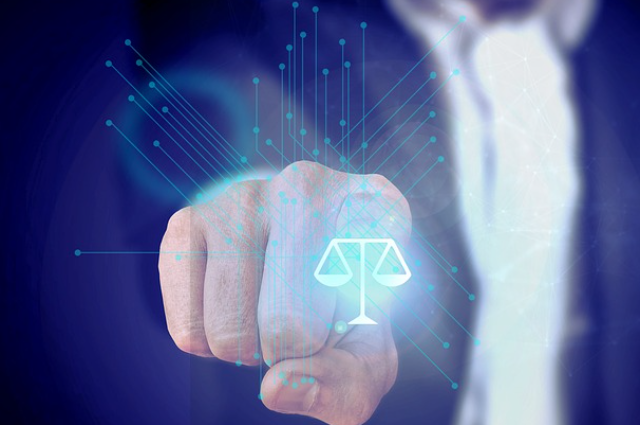
Image by herbinisaac from Pixabay
The twenty-first century is an era of rapid transformation, where almost every aspect of human life is being reshaped by technology. One of the most powerful drivers of this change is Artificial Intelligence (AI). Once thought of as a futuristic idea limited to science fiction, AI has now become a reality, influencing sectors like healthcare, banking, education, defence, and governance. The legal field—often known for its traditional methods and resistance to change—is also undergoing a major shift. The arrival of AI in law is not simply a matter of convenience; it raises deeper questions about justice, fairness, ethics, accessibility, and human values.
The Legal Profession and the Rise of AI
Law as a profession has always been linked with deep study, careful interpretation, logical reasoning, and strong advocacy. Lawyers and judges spend years understanding statutes, analysing precedents, and learning how to apply legal principles with both intellect and empathy. Unlike many technical professions, law requires not just knowledge but also compassion, ethical judgment, and sensitivity to human circumstances.
AI, however, is pushing these boundaries. Today, AI-powered legal research tools can scan thousands of judgments in seconds, identify important precedents, and even estimate the chances of success in a case. Contract-drafting software can prepare error-free legal documents in minutes. Predictive analytics can analyse past rulings to forecast how a judge might decide on a particular issue. Even chatbots and virtual assistants are providing citizens with basic legal guidance without the immediate need for a lawyer.
This new technological wave is bringing greater speed, affordability, and accessibility into the justice system—something badly needed in countries like India, where millions of cases are stuck in backlog.
Benefits of AI in Legal Practice
The entry of AI into law offers many advantages:
- Efficiency and Accuracy – AI reduces human error in repetitive work like proofreading, compliance checks, and case referencing. Tasks that once took hours can now be done in minutes.
- Lower Costs – Legal services are often expensive and out of reach for ordinary citizens. AI-driven platforms can make legal advice cheaper and more accessible, extending justice to marginalised groups.
- Faster Case Disposal – With courts burdened by huge pendency, AI can support faster file management, document preparation, and even assist in drafting judgments.
- Global Access – AI allows legal professionals to access international case law, treaties, and comparative jurisprudence instantly, strengthening cross-border practice.
- Judicial Assistance – AI can help judges by organising evidence, highlighting contradictions, and pointing to relevant precedents—speeding up their decision-making without taking away their discretion.
Challenges and Concerns
Despite these benefits, the use of AI in law comes with serious challenges:
- Algorithmic Bias – AI works on data fed to it. If that data contains social or historical bias, the system may reinforce discrimination, for example, in criminal sentencing or risk assessment.
- Loss of Human Element – Law is not just about applying rules. It requires empathy, fairness, and moral reasoning, which machines can never fully replicate.
- Employment Concerns – Many fear that AI will replace junior associates, clerks, and paralegals whose work revolves around research and drafting. This could lead to job displacement.
- Data Security – Legal work involves sensitive information. If AI systems are not secure, there is always a risk of data leaks or misuse.
- Accountability Issues – If an AI tool makes a wrong prediction or leads to an unfair outcome, who should be held responsible—the software developer, the lawyer who used it, or the system itself?
The Lawyer of the Future
The key debate is whether AI will replace lawyers or simply change the way they work. History suggests that technology rarely eliminates professions; instead, it reshapes them. Just as computers and online databases transformed legal research but did not eliminate lawyers, AI is also more likely to transform roles rather than destroy them.
The lawyer of tomorrow will not be replaced by machines but by those lawyers who know how to use machines. Routine work—legal research, documentation, compliance checks—will shift to AI. Human lawyers will focus more on strategic thinking, negotiations, advocacy, and client relationships.
Legal education, too must adapt. Law schools will need to introduce training in legal technology, AI ethics, and data law, so that future lawyers can critically analyse and supervise AI outputs instead of blindly relying on them.
AI in Judiciary: A Balanced Approach
Around the world, experiments are already happening. Estonia has tried using AI-based judges for small disputes. In the U.S., AI tools are being used to evaluate bail risks. In India, the Supreme Court has taken steps to digitise records and test AI systems for judicial assistance.
Yet, there is agreement that final decisions must remain with human judges. Law is not just a mechanical process but an expression of fairness rooted in conscience, empathy, and values.
Conclusion
The arrival of Artificial Intelligence in the legal field is both inevitable and revolutionary. It offers immense opportunities—faster justice, reduced costs, and wider access to legal services—but it also brings dangers like bias, job loss, and over-reliance on machines.
The future of law lies not in rejecting AI, but in embracing it responsibly. Lawyers must evolve into professionals who combine legal expertise with technological understanding, ensuring that AI works as a supportive tool, not as a substitute for human wisdom.
Ultimately, law is about justice, and justice is deeply human. No matter how advanced machines become, they cannot replace the conscience, empathy, and moral reasoning of human beings. The lawyer of the future will be one who stands at the intersection of technology and humanity, ensuring that AI strengthens justice instead of weakening it.
